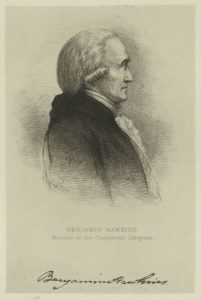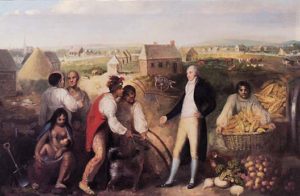Benjamin Hawkins, Indian Agent, Creek Nation
Benjamin_Hawkins
Mission to Deceive and Defraud the Nations
Benjamin Hawkins is frequently touted as some sort of hero and “instructor,” to the “uncivilized” Native American masses, expressly, the Creeks. Hawkins was however, a deceitful undercover agent for the United States government. A veteran of the Revolutionary War, Hawkins had no use for his former adversaries. Hawkins’ efforts, at the direction of the War Department, were to discern the strengths and weaknesses of the Creek Nation, and to convey the goodwill of the United States. Hawkins arrogantly set about fulfilling his mission: separate the Nation from their prime land; build a road through their country; and supplant their culture by upending its matrilineal foundation. Hawkins’ efforts were largely successful.
A decade before the so-called Creek Civil War of 1813, Hawkins had his marching orders from the War Department. On direct orders to defraud and deceive the Creek Nation of Indians, in a letter from Henry Dearborn, Secretary of War, James Wilkinson, Benjamin Hawkins, and William R. Davie, were instructed to employ connivance with the Cherokee Nation:
. . . it is evident that the [Cherokees] have testified much dissatisfaction, on hearing that the Government were about to request them to cede more land, it is the wish of the President that you should treat the subject with great tenderness, and that you should not press them on any other subjects than those which relate to roads, and settlers thereon. You will impress upon them the belief, that the United States have no desire to purchase any of their land, unless they are quite willing to sell; that we are not in want of lands, but only wish to be accommodated with such roads as are necessary to keep up a communication with all parts of the United States, without trespassing on the lands of the red people . . . [emphasis added – one could easily insert another tribe.]
War Department
July 3, 18011
Over ten years, Agent Benjamin Hawkins practiced his dissembling message of so-called “civilization” to the Creeks. As excerpted above, his express orders involved deception. Hawkins acquired land and property by cohabiting with an Ocmulgee Creek woman, and fathering her children, in contravention to his policies. He benefited handsomely (a Flint River Plantation), as did others, by his association with the “unwashed masses.”
1 The Library of Congress, “A Century of Lawmaking for a New Nation: U.S. Congressional Documents and Debates, 1774 – 1875, American State Papers, Senate, 7th Congress, 1st Session, Indian Affairs: Volume 1, Page 650 of 861 (accessed: August, 2016).
